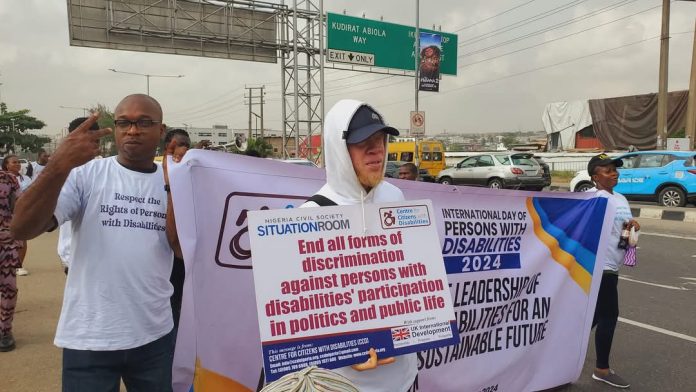In a resounding call for inclusion and equity, the Centre for Citizens with Disabilities (CCD) has urged the Lagos State Government to fully implement the rights of Persons With Disabilities (PWDs) as enshrined in the Lagos State Special People’s Law. This appeal was made during a road walk in Lagos to commemorate the 2024 International Day of Persons With Disabilities (IDPWD).
Themed “Amplifying the Leadership of Persons with Disabilities for an Inclusive and Sustainable Future,” the event brought together various clusters of the disability community to highlight their concerns and advocate for equal rights and opportunities.
Pushing for Equal Rights
Addressing participants during the walk, Florence Austin, Finance Admin Manager for CCD, called on the Lagos State Government to uphold its commitments to PWDs by enforcing policies that ensure inclusion across all sectors.
“There is ability in disability, and every PWD has the potential to make a positive impact if given the opportunity,” Austin said. “We demand inclusivity in education, health services, employment opportunities, and budget allocations. The rights of PWDs must not remain on paper—they must be implemented in practice.”
Austin stressed the importance of transitioning from a charity-based approach to a rights-based model. “PWDs are not asking for handouts; they are demanding their rights as equal citizens,” she added.
Standing Against Discrimination
Austin further emphasized the need to eliminate all forms of discrimination against PWDs, calling for an accessible civic space that enables PWDs to participate equally in societal activities.
“Enough is enough. We cannot continue to face discrimination, isolation, and harmful practices. Access is key—be it attitudinal, environmental, or systemic. These barriers must be dismantled to allow PWDs to thrive on an equal basis with others,” she asserted.
Marching for Change
The road walk, supported by the Nigeria Security and Civil Defence Corps (NSCDC) and the International Red Cross and Crescent Movement, began at Allen Junction in Ikeja and ended at the Lagos State House of Assembly, Alausa. Participants, representing various disability clusters, carried banners and placards inscribed with powerful messages, including “Nothing About Us Without Us.”
Branded in T-shirts, the groups included individuals who are deaf, blind, physically challenged, albinos, dwarfs, and others from the disability community. Their presence symbolized unity and resilience, reinforcing their collective demand for systemic change.
Despite standing at the gates of the Lagos State House of Assembly for 30 minutes, no government official addressed the group. However, their demands were clear and unrelenting.
“Nothing About Us Without Us”
One of the participants, Mr. Yinka, popularly known as “Fine Boy,” who is visually impaired, highlighted the need for direct engagement with PWDs in policy-making.
“Nothing about us without us,” he declared. “The government must involve us in decision-making processes that concern us. Decisions made on our behalf without consulting us are inadequate and ineffective.”
Yinka’s words encapsulated the sentiments of many PWDs who feel excluded from meaningful conversations about their rights and welfare.
A Call for Collective Action
The road walk underscored a broader call to the public and the government to champion inclusion for PWDs. Austin urged society to campaign against barriers that hinder PWDs’ participation in social, economic, and political spaces.
“Everyone has a role to play,” she said. “It’s not just about laws—it’s about changing attitudes, creating enabling environments, and ensuring systemic fairness. We are calling on the public to respect our rights and recognize our potential.”
A Movement for an Inclusive Future
The IDPWD road walk in Lagos was more than just an event; it was a movement—a call to action for a more inclusive and sustainable society. With their voices amplified and their demands clear, the PWD community in Lagos sent a powerful message: their rights are non-negotiable, and their contributions to society are invaluable.
As the global focus on inclusivity intensifies, the spotlight now rests on the Lagos State Government and the broader public to respond to this clarion call. The time to act is now—because, truly, there is no sustainable future without the inclusion of all.


